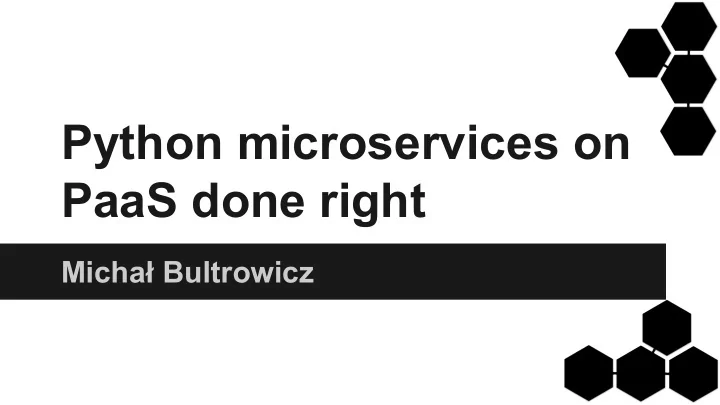

Python microservices on PaaS done right Michał Bultrowicz
About me ● Work at Intel Technology Poland. ● I do backend services. ● Sadly, mainly in Java. ● I did some C++ security... ● ...and multiplatform distributed automated testing soft. ● I really, really like Python. ● It’s my first time presenting.
Thanks for the help Izabela Irzyńska
Agenda 1. Microservices introduction. 2. PaaS introduction. 3. Ingredients of a sane project (with microservices and PaaS). 4. Using Python for that project. 5. Other tools and procedures that you need.
Microservices - Independant - Cooperating - Scale well (e.g. Netflix) - “Small” - 12factor.net - Way to handle big teams
Platform as a Service - Cloud for applications, not (virtual) machines - Encapsulates applications - Eases connecting apps together - Simplifies deployment - Helps with logging http://www.paasify.it/vendors
Microservices on PaaS - The way to go - Increase the benefits - Easy scaling - Adaptability - Testable - Measurable
Not a silver bullet - Really painful without good automation - Communication overhead - Performance overhead - Risky to start without a monolith http://martinfowler.com/bliki/MonolithFirst.html
Microservices requirements 1. Twelve factor applications 2. Automated multi-tier testing 3. Continuous delivery pipeline 4. Insight/metrics 5. Proper management 6. Platform versioning
Why use Python for that? - As many features/libraries as anything else (or more). - Fast prototyping. - Easy testing (but static type checking wouldn’t hurt...). - Good at loose coupling - Deterministic garbage collection (weakref) - It’s enjoyable. - More...
Sufficient performance - Don’t trust me! Or anyone! (with benchmarks) - Falcon + uWSGI vs. Spring Boot + Tomcat Req/s mean failed 50th pct 75th pct 95th pct 99th pct Max ms/req reqs < (ms) < (ms) < (ms) < (ms) Falcon 722 1490 2.8% 59 1038 11782 22376 52193 Spring 585 5924 0.7% 5421 6484 11293 28092 39639
The app # app.py ● Enter Falcon! import falcon ● Light! import json class SampleResource: ● Fast! @staticmethod def on_get(req, resp): ● No magic! resp.body = 'Hello world\n' ● ...young… app = falcon.API() app.add_route('/', SampleResource()) ● I’m not on the team http://falconframework.org/
# app.py import falcon import json class SampleResource: @staticmethod def on_get(req, resp): resp.body = 'Hello world\n' # THE NEW THING @staticmethod def on_post(req, resp): ''' Given JSON input returns a JSON with only the keys that start with "A" (case insensitive). ''' if req.content_type != 'application/json': raise falcon.HTTPUnsupportedMediaType('Media type needs to be application/json') # PYTHON 3 body_json = json.loads(req.stream.read().decode('utf-8')) resp.body = json.dumps({key: value for key, value in body_json.items() if key.lower().startswith('a')}) app = falcon.API() app.add_route('/', SampleResource())
CloudFoundry app example_app ├── example_app │ └── app.py ├── tests │ ├── test_app.py │ └── requirements.txt ├── service_tests │ ├── test_service.py │ └── requirements.txt ├── requirements.txt ├── tox.ini ├── manifest.yml ├── runtime.txt └── .cfignore
manifest.yml --- applications: - name: example-app command: uwsgi --http :$VCAP_APP_PORT --module example_app:app # etc. memory: 128M buildpack: python_buildpack services: - redis30-example - other-example-app-service env: LOG_LEVEL: "INFO" VERSION: "0.0.1"
Continuous delivery DO IT OR DIE
CD flow $ git clone --recursive <app_repo> $ tox $ bumpversion micro $ cf push $ python3 test_e2e.py $ cf target <production_env> $ cf push
Unit testing - HTTP
#test_app.py import json from falcon import testing from falcon_app.app import app class SampleTest(testing.TestBase): def setUp(self): super().setUp() self.api = app def test_sample_post(self, original_dict, expected_dict): response = self.simulate_request( '/', decode='utf-8', method='POST', body=json.dumps({'abra': 123, 'kadabra': 4}), headers=[('Content-type', 'application/json')] ) self.assertEqual( response, json.dumps({'abra': 123}) )
Unit testing - pub/sub
Service testing
Tox config ● Unit and service test ● Only one Python version. ● No packaging (skipsdist=True) ● Full app analysis (coverage, pylint, etc.) ● Run on dev and CI machines
Swagger - live API docs
Swagger’s potential
E2E/acceptance tests ● Done in staging env ● Run after each commit to master ● ...or nightly ● Only crucial journeys through the system ● Owned by everybody, monitored by selected
Monitoring ● In staging and production. ● State of PaaS resources. ● Periodically runs E2E. ● E.g. Zabbix
Logs and metrics ● All apps log to std out ● Cloud Foundry gathers all logs in a stream ● Logsearch: Cloud-scale ELK ● InfluxDB for real-time metrics
Management tips ● Every app needs an owner ● ...and an additional reviewer ● Review mercilessly ● Nobody is unquestionable ● Architecture visualisation
Platform deployments ● Custom implementation ● E.g. a big manifest binding others together ● Can increase the risk of coupling
More info ● Sam Newman, Building Microservices , O’Reilly ● http://martinfowler.com/articles/dont-start-monolith.html ● http://martinfowler.com/bliki/MonolithFirst.html ● http://martinfowler.com/articles/microservice-testing/ ● http://docs.cloudfoundry.org/ ● http://www.logsearch.io/ ● http://www.cloudcredo.com/how-to-integrate-elasticsearch-logstash-and-kibana-elk-with-cloud- foundry/ ● uWSGI performance: http://blog.kgriffs.com/2012/12/18/uwsgi-vs-gunicorn-vs-node-benchmarks. html, http://cramer.io/2013/06/27/serving-python-web-applications/ ● https://speakerdeck.com/gnrfan/restful-microservices-with-python ● EuroPython 2015 talks: “Nameko for Microservices”, “Beyond grep: Practical Logging and Metrics”, “A Pythonic Approach to Continuous Delivery”
Recommend
More recommend